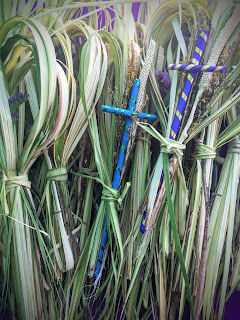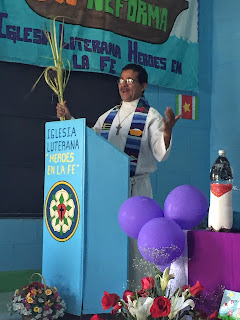Holy Week in El Salvador: Palm Sunday
This year, for the first time, we are spending Holy Week and Easter Sunday in El Salvador. I am planning to write a series of stories about our experiences during this week. This is the first...
La Semana Santa, Holy Week, begins with the Sunday of the Palms, el Día de los Ramos. The streets of San Salvador appeared no different than any other Sunday, with not much traffic and a few folks out jogging or riding their bikes. As we made our way into the countryside, we passed by bus stops where families stood holding small bundles of palms - evidence that perhaps they had attended early mass. We approached our church community and were greeted by clergy and pilgrims from the local Catholic Church marching with their palms and carrying a large statue of Jesus. We climbed the hill to the Lutheran Church, where we were greeted by children, purple balloons, and a large banner featuring the face of Monseñor Oscar Romero. The words on the banner: "You will not kill." For many, those words provoke memories of Romero's sermons.
 |
| Bundles of palm leaves, decorated with crosses, purple flowers and a stalk of grain |
 |
| You will not kill - Prophet of the People |
We waited until the pastor determined we had a quorum - not too much after 8:30 AM. A little offering of 25 cents was requested for the palms, for those who could pay it. We gathered outside to bless the palms. Pastor Santiago and a pastor friend from Germany dipped their palm bundles in water and shook them out over the people with their palms. No one minds getting damp on a hot summer morning. Then we sang, "No Matarás"...
You will not kill. You will not kill.
for God's sake, for the people's sake,
I order you, you will not kill.
Evil is the man that orders to kill the poor.
God is a God of life and not of death.
Evil is the man that denies the worker's rights.
The poor is the new man that will make the earth new.
Evil is the man that unites one hacienda with hacienda.
The harvest is for all; do justice.
Evil is the man that makes laws and decrees that oppress the humble
and which defend the rich.
Blessed is the man that struggles without tiring for life,
to give death to death and light to the people.
The confluence of the anniversary of Romero's assassination, Palm Sunday and the anniversary of the founding of this community floods the community with a little extra spirit and joy, and an awareness of what has been lost. The end of the war did not mean the end of violence for this community. There are joys, but there are also deep sorrows. The scriptures for the day mirror the life of the community - hosannas of joy and sorrows of violence. We read the Passion Story from Mark 14. Then Pastor Santiago preached:
Jesus is right there, above your shoulders. His face is close to yours. He is with you...
Jesus can understand the community. He can understand the humble people who are oppressed and humiliated. He gets it. He was hungry. He was thirsty. He was beaten and humiliated, so he understands. And at the toughest moment, what did Jesus say? "Oh my God, why have you forgotten me?" We say this. How many times have we said this? We think it. We say it, and Jesus understands...
It is important that we comprehend the value of the obedience and faith of Jesus - what it took for Jesus to go through what he did. We should be obedient, but how can we be? Only if we love God. Just how much do we love God? ...
[Pastor Santiago held up his palm branch.]
This branch is a symbol. Who is the true palm branch? [long pause] You! What will happen to this palm branch? It will become ashes. One day you will be ashes, like the palm. We keep the palm all year and before Lent begins again, on Ash Wednesday, the palm is converted to ashes. We should recognize that we are vulnerable. Today we are young and strong like these palms we have. We don't think we are vulnerable, but we won't always be like this. Put your palm in your home, somewhere special where you can see it, where everyone in the house can see it. It is a reminder of today, of the message of today...
 |
| Who is the true palm branch? |
In the passion story we heard about the woman with the expensive jar of perfume. She understood the value of that particular moment - of Jesus incarnate and with her. She understood and used the perfume...
When you walk home, lift your palm high for all to see that we carry a mission. Someone will say to you, "oh you went to church today," and you will say, "oh yes, yes I did!" Be ready with a response. What does it mean that you went to church today? What does it mean that you carry a palm? What is this mission we are on?
We are on a mission to look for a place to prepare, like the disciples. Jesus sent them to prepare. For what? For a supper and the washing of feet. This is our mission, to serve those most in need.
Do you have perfume at your house? Maybe your bottle of perfume is a glass of water for someone who is thirsty. Maybe your perfume is a little tortilla to share. Maybe your perfume is a smile.
Whatever our perfume is, recognizing the moments in which Jesus comes to us as hungry, thirsty, frightened, questioning, lonely or sad, we need to bust open the jar and recognize an incarnation moment, to value it and live into it, while we can.
There is a slogan which has become central to our sister church relationships - we three congregations which are situated in a community in El Salvador and in an urban area and a suburban area in the US. The slogan is "love life" - inspired by a young woman who was killed in an accident in the US, and whose family encourages everyone around them to break open their jars of perfume, and love one another. As worship concluded, I noticed a little flair of pink inside the back cover of the hymn book...
Hold your palm high. Place it where all can see. Break open your jar of perfume. Recognize and value moments of incarnation. Love God. Love Life. Love one another.
 |







Comments
Post a Comment